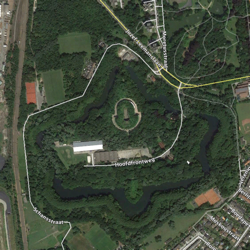Sep
14
Antwerp – Belgium’s National Redoubt
Filed Under History & Geography on September 14, 2014 | 3 Comments
 Note: myself and Allison Sheridan had a good discussion around this post on episode 488 of the NosillaCast podcast (starting at 51:34).
Note: myself and Allison Sheridan had a good discussion around this post on episode 488 of the NosillaCast podcast (starting at 51:34).
Between 1851 and the end of the first world war, the city of Antwerp was Belgium’s so-called National Redoubt. It was decided that it would not be feasible to defend all of Belgium, so, the defence should instead be focused on holding a defensible part of the country until help could arrive from one of the powers guaranteeing Belgian neutrality. The city chosen for this purpose was Antwerp.
The fortifications built around Antwerp were impressive, in scale and design, both from a military and architectural point of view. They are without a shadow of a doubt archeological treasures, especially the late 19th century structures designed by the acclaimed fortification designer General Brialmont. While the later works were all more advanced militarily, they were never as architecturally beautiful as the late-19th century Brialmont forts.
Ultimately, the National Redoubt would never prove a resounding military success, but that doesn’t take away from it’s cultural, architectural, or historic importance. The redoubt had a big impact on the nation as a whole, and much more so on the province of Antwerp. The engineering work was on a scale comparable to that of building a railway network, and while much of that work is, by design, not easily visible at ground level, it’s immediately obvious from the air if you know where to look.
Sep
12
A War Hero Recognised at Last
Filed Under Polemics & Politics, Computers & Tech on September 12, 2009 | 6 Comments
I imagine there are very few people reading this blog who don’t know that the Allies won the second world war. I also imagine that many, if not most, of you have heard of Enigma machines, and that a significant number of you know that the British managed to crack the Enigma codes as well as other German and Axis codes. This was a massive advantage for the Allies, and in no small way, helped to turn the tide of war against the Axis powers.
However, I imagine that there are not too many of you who have heard of Alan Turing. Academically he laid the very foundations upon which computer science, and hence our entire digital world, are built. His 1936 paper entitled “On Computable Numbers, with an Application to the Entscheidungsproblem” doesn’t sound very relevant to Twitter or FaceBook, but it’s one of the foundation stones on which all these things rest. You’ll note that Turing’s work on the theory of computation pre-dates the existence of any actual computers!






